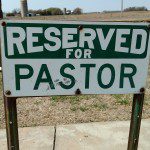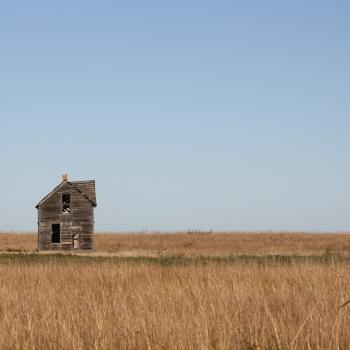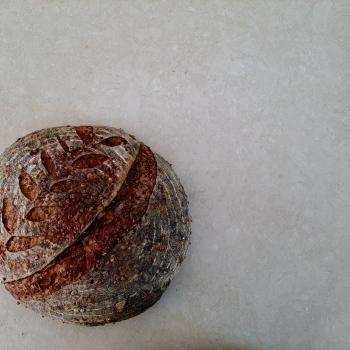
It’s fall, and there’s a tease of tomatoes in the garden. The vines are mostly wilted, crusty as scabs. The leaves are mottled. A yellow garden spider has spun its zigzag web between a tomato cage and the compost bin, its grasshopper-snaggling concertina line. My dreams of salsa are gathering cobwebs.
I know it’s inevitable, but I approach summer’s passing every year with a little regret. I look at my straggle of garden and think that there should be quarts of salsa lined up on our basement shelves. But for (very good) reasons, it never happened. Now the door is shut on that fresh goodness from the garden.
A Sunday ago, I preached an optimistic sermon about Jesus as the one who opens doors. He has the keys of Death. He holds the keys of David. He opens the door, and no one can shut. He shuts and no one can open (Revelation 1:8; 3:7).
I’ve experienced God opening doors for me so many times, in so many gigantically undeserving ways. But I’ve also hit closed doors more times that I can count. Open doors are always more fun. Those are the stories we like to tell. But life’s about the closed doors just as much as it’s about the open.
Jesus closes doors, and no one can open them. Thus was the experience of the great heroes of the faith. Moses couldn’t go into the promised land. David couldn’t build the temple. Elijah couldn’t retire to a cave on Mt. Horeb. Paul couldn’t cross over to Bithynia (Numbers 20:1; 2 Samuel 7; 1 Kings 19; Acts 16:7). Shouldn’t we expect a few closed doors in our own lives?
Sometimes, the bumper sticker theology is right: when one door closes, another opens. I’ve experienced that reality. It’s the closed door as God’s guidance–or maybe God graciously keeping us out of trouble.
But at some point, all of us will run up against a closed door that we think ought to be open. It will be something good, something worthy, something right. We’ve waited for it. We’ve worked for it. Maybe we even deserve it. And the door will be closed. The relationship won’t work out. The job won’t come through. We regret to inform you that…whatever. And even those closed doors pale in comparison to the profound losses of death and illness and estrangement, doors whose closing don’t mean merely diminished life choices, but diminished life. What then?
All too often, this is where we end up stuck in regret. It’s the conga line of coulda, woulda, shoulda dancing through our heads when we shoulda been sleeping. But most of the time, regret is a soppy little emotion, a pitiful stand in for repentance. Regret caws and pecks at us. Regret crowds the fence and glares at us with its beady black eyes.
A better way forward might be to see life’s closed doors as pointing us toward an encounter with the living Jesus. Closed doors can be come-to-Jesus moments. We come to Jesus in the twangy old sense in which we realize how much we need to rely on him. But closed doors can also shatter our false images of who Jesus is and what Jesus should do. Closed doors point us beyond Jesus the life coach toward Jesus the crucified savior–less fist bump and more sweating great drops of blood. Closed doors mean coming nose-to-nose with what writer Michael Mears Bruner calls the “subversive nature of God.” 1
Jesus subverts our usual value sets–values that are almost always self-centered–and points us toward something more real, something truer. It turns out that Jesus’ goal is not our success or life fulfillment. What he wants is that we become real and true human beings, people whose lives bear a resemblance to his. Sometimes, closed doors are the places Jesus works his life-changing magic on us. Sometimes, they’re opportunities for us to look deeper, a chance for us to bury regret for what could have been and walk into newness of life through Jesus who is the door (John 10:9).

1Quoted in Christian Century v.134:no.20, 2017, p.39












